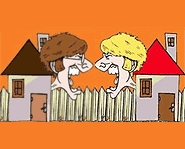Neighbor Dispute Over Vegetable Garden a Waste of Judicial Resources
A woman in Oak Park, Michigan could spend 93 days in jail for growing vegetables in her garden. When Julie Bass replaced the grass and trees in her front yard with cabbage, carrots, tomatoes etc., her neighbor called the city and complained. The neighbor felt that Bass’s yard disrupted the look of the neighborhood. Bass was issued a ticket, which she refused to pay. Now, the case is in the beginning stages of litigation.
This story is a perfect example of a neighborhood dispute that went too far. Why neighbors prefer to litigate, rather than sit down over a cup of coffee and sort out their differences, is beyond my understanding. Taking a closer look into this case yields how unlikely it is for the offended neighbor to win.
 The neighbor claims that Bass’s yard disrupted the look of the neighborhood. A possible legal justification for this claim could be nuisance. Property law includes an area devoted to specifically to defining nuisance. For a nuisance, there needs to be some unreasonable or unlawful use of property and a resulting damage to another which prohibits the person from enjoying his or her property.
The neighbor claims that Bass’s yard disrupted the look of the neighborhood. A possible legal justification for this claim could be nuisance. Property law includes an area devoted to specifically to defining nuisance. For a nuisance, there needs to be some unreasonable or unlawful use of property and a resulting damage to another which prohibits the person from enjoying his or her property.
It cannot be said that Julie Bass has made some unreasonable or unlawful use of her property. Bass tore up her front lawn, installed a new sewer system, and planted vegetables in raised wooden planters. Her actions are not unreasonable, nor is it against the law to landscape your property in such a fashion. Additionally, there is no proof that the neighbor has suffered damage to the extent that he or she cannot enjoy his or her property. Not liking a fellow neighbor’s landscaping ideas and actions is not enough to declare a nuisance. One needs some resultant damage and inability to enjoy one’s property, which does not seem to be the case in this situation.
Another option for the neighbor is to try to get a permanent injunction prohibiting Bass from growing her vegetables. Again, the neighbor would have to show some sort of inadequate damage and practical reasoning for the injunction. With the facts of this situation, it is going to be very difficult to show that the neighbor has suffered some sort of damage from Bass’s yard to the extent that an injunction is the only possible remedy. It seems very unlikely that the neighbor could convince the court to grant a permanent injunction, prohibiting Bass from growing vegetables.
One thing to note is that important facts are missing from this news report. There are no pictures of Bass’s yard so that the reader can paint a picture in his or her head. We do not know how far Bass’s home is from her other neighbors. We do not know if the system(s) installed produce loud noises or requires high maintenance to the extent that it is disruptive to the neighbors. We also are not told what the “look of the neighborhood” is. Perhaps if the neighbors were very close and the system(s) in place were very loud, the neighbor may have some justification to prove a nuisance or have a permanent injunction granted.
However, as the article reads, there seems to be no damage suffered by the neighbor. Additionally, how can vegetation disrupt a neighborhood’s look? Most people have grass and flowers in their yards. Instead of flowers, if a person has vegetables, it certainly is not an eyesore.
Rather than wasting judicial resources on such miniscule matters, neighborhoods should work together to sort out their differences. Many neighborhoods have neighborhood watch groups where people come together and discuss safety matters for the neighborhood. Similarly, a group should be created where neighbors can come together and sort out their differences regarding each others’ properties, landscaping choices etc. Not only will such groups emphasize the importance of communication, but it will strengthen the unity amongst neighbors. This in turn will lead to less frivolous lawsuits, and keep the courtrooms free for more pertinent matters.

Comments
This is an egregious wast of judicial resources, especially when mediation is such a viable alternative. It’s the type of case that cries out for alternative dispute resolution. The power of the court system is circumscribed by the law. In mediation, the parties can actually interact with each other and the mediator can think outside the box to come up with creative solutions. In this case, for example, perhaps the high growing vegetables could be confined to the sides of the house and low growing vegetables could be planted in front, surrounded by flowers. In fact marigolds are known to keep away certain garden pests.